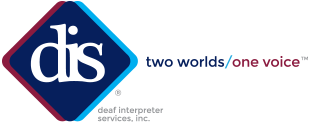By Marilyn Weber
In the early ’90s, I began learning sign language so I could always be able to communicate at a very in-depth and abstract level with my daughter who is deaf. I worked in a hospital pharmacy at the time, and I started attending a pilot program for interpreters for the deaf in Austin, Texas. I never intended to become an interpreter; I just wanted to be involved in my daughter’s world.
I continued on to become certified as a sign language interpreter, and very quickly began to be pulled from the pharmacy to work as an interpreter in the hospital. By 1993, I decided to go into interpreting full time.
I saw early on the tremendous need for professional sign language interpreter services in my hometown of San Antonio and beyond. There was a serious need for professional interpreters, not only in the school systems, but for the community as well. Deaf individuals were having to rely on writing back and forth in English, a foreign language to most ASL users, for medical appointments, job interviews and orientations, business meetings, and legal situations. And, there were many terrible situations that arose from the inadequacies in the communication access for people who were deaf.
I worked as an interpreter at two different universities for about three years, and then I met the woman who had founded Deaf Interpreter Services (DIS). I worked for her part time for a year, and then finally bought the business from her in 1998. We began with only three part-time employees in 1993, but quickly expanded, and went nationwide in 2001. Today, we have more than 65 employees in San Antonio alone, and a couple hundred more nationwide.
DIS has succeeded in large part because of the wide variety of services we offer. We specialize in providing 24/7 interpreting for the medical, legal, business and educational markets. We provide certified sign language interpreters, certified Deaf interpreters (CDI’s) and intermediaries, as well as tri-lingual interpreters (English, Spanish, ASL) and many other services.
Keeping up with a changing world
Two major changes in Deaf Culture have taken place during the quarter century that we’ve run this business, and both signal dramatically increased opportunity for the deaf community. The first is important national legislation on disability. The second is the rapid pace of technology, which has opened up all kinds of new communication options for people who are deaf.
In 1906, the U.S. Civil Service passed a law banning deaf people from employment. Seventy years later, things had dramatically changed, and the nation showed genuine interest in ensuring equality for individuals who are deaf, and recognizing the incredible benefit they bring to the workforce. Congress passed the Education for All Handicapped Children Act of 1975, which was renamed IDEA (Individuals with Disabilities Education Act) in 1990, enabling a generation of deaf children to have a free and appropriate education just as their hearing peers have. These children were just beginning to turn into adults at about the time I bought DIS, and were engaging with society in record numbers – enhancing the need for interpreters. Only a few years before I purchased DIS, the Americans with Disabilities Act (ADA) of 1990 was passed. The ADA set federal standards that require accessible communication and accommodations for deaf individuals in public places.
Since then, powerful technology advances have begun offering all kinds of new opportunities for the deaf. Video relay services (VRS) was launched nationally a bit more than a decade ago, and is paid for by everyone through their phone taxes. Using VRS, a deaf person can initiate a video call at any time day or night to a VRS service, and a communications assistant who is fluent in both, sign language and English, will appear to assist the phone calls in the deaf person’s native language, ASL. It’s amazingly fast. When coupled with high-speed internet access, VRS opens all sorts of new worlds to deaf people.
A record number of deaf and hard-of-hearing people — more than 50 percent — are employed today. Many deaf people, in fact, own their own businesses. For instance, the city of Austin, Texas, has some 30 deaf-owned businesses. Deaf individuals work in businesses ranging from technology and accounting companies to yoga studios and bakeries.
It’s hard to believe that when my daughter was born deaf, what seemed like such a challenge at the time, could turn into such an incredible opportunity to make a difference in so many people’s lives. If it hadn’t been for my deep love for her, I wouldn’t be where I am now forging new opportunities, and witnessing increased respect and awareness for people who are deaf and hard-of-hearing. It’s truly been a blessing all around.
Edited for length and clarity by Nicole Taylor.


